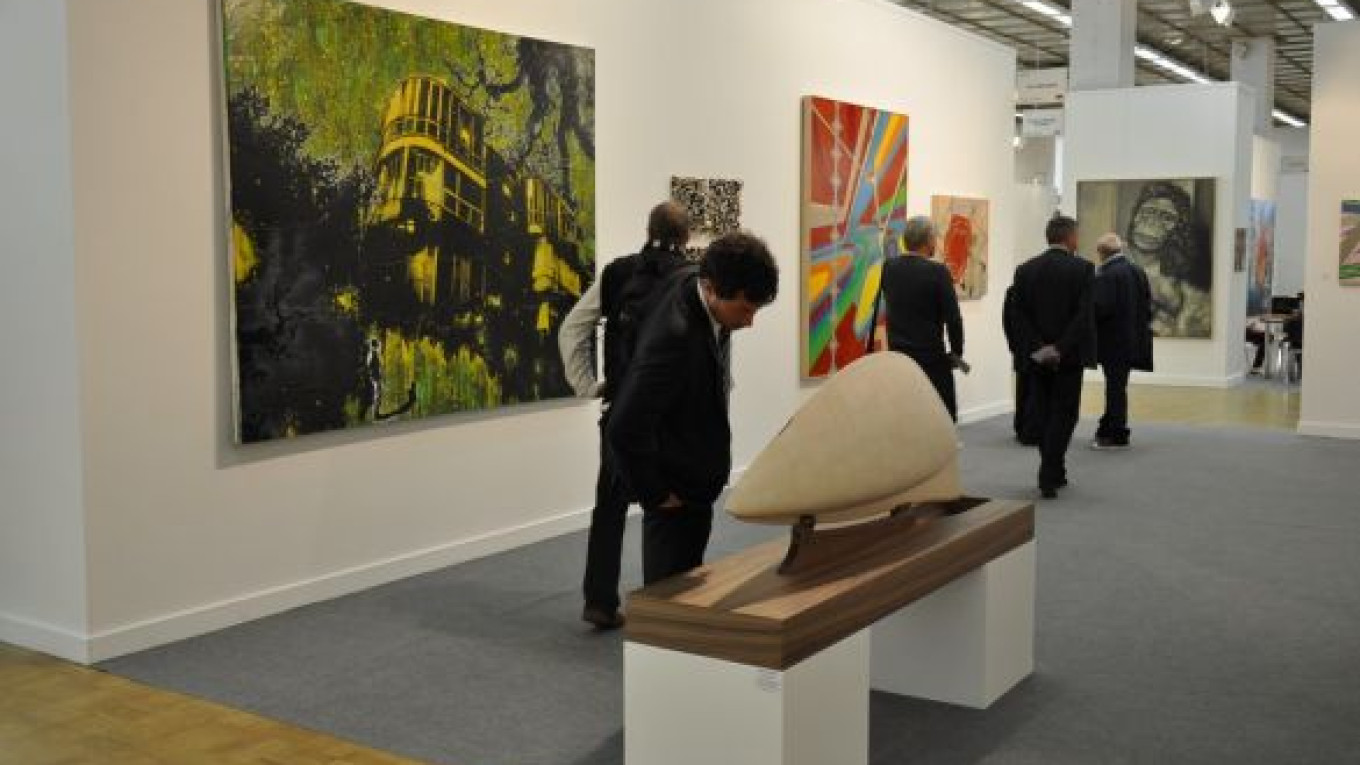When the Art Moscow fair first opened 17 years ago, it was truly a one of a kind event, a fair intended to bring together foreign and Russian galleries, showing the best art the galleries had to offer to Muscovites and anyone else who wanted to come. Now, the yearly art fair is one of the largest in Europe, yet with budgetary woes and a stagnant art market in Russia, it has decided to make significant changes. When the fair opens on Sept. 18, it will be Art Moscow 2.0, a reboot intended to bring new life and purpose.
"Beside the wealthy people, who have now developed a direct access to art anywhere, there is a new middle class who can afford to buy contemporary art," said Eric Schlosser, art director of Art Moscow, in a Q & A session on the Art Moscow website. This opinion on the burgeoning middle class reflects the direction that Art Moscow has taken this year, moving away from the expensive works by well-known names that have dominated the market in previous years towards a focus on young artists and less expensive art.
The traditional art market changes its format this year in the face of steep budget cuts and a moribund art market in Russia.
This approach was tested last year in a special exhibition called "New Platform" that took place on the third floor of the Central House of Artists. This format, which focused on galleries that had existed for three years or less and on works that cost less than $5,000, will become the main event this year, instituting a radical change in the traditional exhibition.
This shift is accompanied by a general change of focus away from the more commercial aspects of the fair. This year, numerous wholly non-commercial events will be added to the traditional fair, including a project from the Bonn Biennale of Video Art that will be shown at the fair. An exhibit organized with the Vienna University of Fine Arts called "From the Virtual to Reality" will be a parallel event of Art Moscow and also part of the 5th Moscow Biennale. More international art will be showcased in the exhibit "Positive / Negative," which will display Polish modern art, while a separate festival called "New Culture Fest" will be held in a different room of the Central House of Artists and is said to examine the future of art. Art Moscow will also be accompanied by a significant discussion and lecture program.
A result of the decommercialization of the fair is a significant reduction of the budget — Art Moscow's budget this year is 10 million rubles ($309,000), down a third from previous years.? "In previous years, the budget for Art Moscow has been about 15 million rubles, with a deficit for our organization of approximately 8 million rubles. The new version of the fair will have a budget of about 10 million rubles, and the deficit will be reduced to about 5 million rubles," said Vasily Bychkov, director of the Expo Park company that organizes the fair, in an interview with RIA Novosti.
Despite this reduction in the budget, the fair will still have a significant deficit, and organizers hope to secure assistance from sponsors. In particular, Bychkov expressed a hope for significant government funding in future years. "Of course, we would be very happy if the government were to take responsibility for partially funding Art Moscow," said Bychkov, explaining that the noncommercial aspects of the market already outweighed the commercial, making it a candidate for government funding.
"As far as I'm aware, the art market doesn't function effectively in all countries and only brings a profit in the U.S., where about 40 percent of the world art trade takes place," Bychkov said, adding that in other countries the art market is only viable if it is supported by the government. Bychkov further noted that most galleries in Russia were currently operating at a loss and that the Russian art market was moribund since the financial crisis.
Overall, the Art Moscow staff seems hopeful that this year will see a re-energized fair in the new format. Art Moscow may be further energized by the fact that the fair will be contemporaneous with the 5th Moscow Biennale, which may help to focus further attention on the arts world in Moscow.
"We will have a real synergy with the Biennale, creating a circulation between both events, which is good for both. It does help that Biennale curator Iosif Bakhstein has been on the board of experts of Art Moscow since its creation," Eric Schlosser said.
Art Moscow will be open from Sept. 18 to 22 at the Central House of Artists, 10 Krymsky Val. Metro Oktyabrskaya. For more information on Art Moscow and associated events, visit the Art Moscow website at art-moscow.ru.
Contact the author at g.golubock@imedia.ru
A Message from The Moscow Times:
Dear readers,
We are facing unprecedented challenges. Russia's Prosecutor General's Office has designated The Moscow Times as an "undesirable" organization, criminalizing our work and putting our staff at risk of prosecution. This follows our earlier unjust labeling as a "foreign agent."
These actions are direct attempts to silence independent journalism in Russia. The authorities claim our work "discredits the decisions of the Russian leadership." We see things differently: we strive to provide accurate, unbiased reporting on Russia.
We, the journalists of The Moscow Times, refuse to be silenced. But to continue our work, we need your help.
Your support, no matter how small, makes a world of difference. If you can, please support us monthly starting from just $2. It's quick to set up, and every contribution makes a significant impact.
By supporting The Moscow Times, you're defending open, independent journalism in the face of repression. Thank you for standing with us.
Remind me later.


